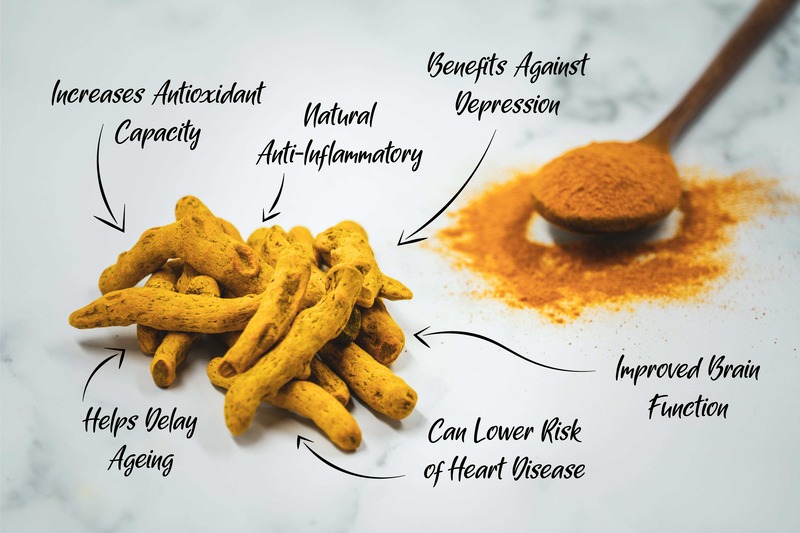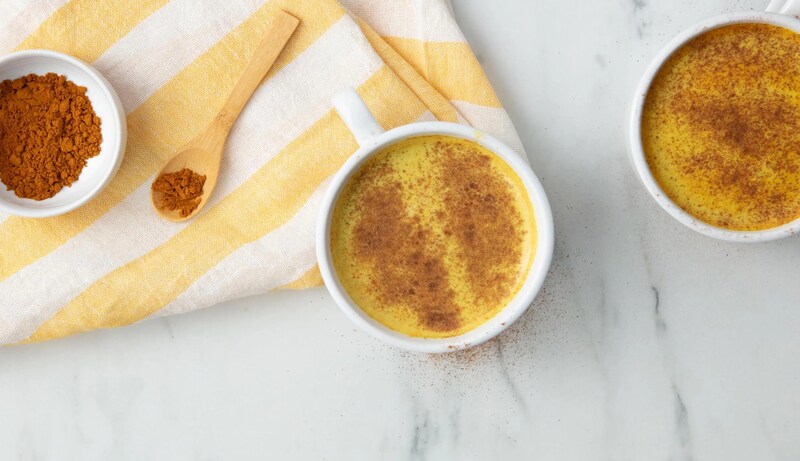In the realm of natural health, Turmeric is a vibrant, yellow spice frequently found in Asian cuisine. It emerges as a powerhouse of known and even unknown benefits. Culinary uses aside, it harbors an active compound, curcumin. This offers numerous health benefits. Ancient Ayurvedic practices revered Turmeric for its anti-inflammatory and antioxidant prowess, which modern science today validates.
Turmeric Health Benefits
Let’s shed light on the diverse health benefits of Turmeric.
Anti-Inflammatory Marvel:
Curcumin attributes turmeric's potent anti-inflammatory effect, as a crucial element in its health profile. Scientific studies underscore the effectiveness of turmeric in mitigating chronic inflammation, a pervasive factor across diverse diseases.
Powerful Antioxidant Properties:
As a potent antioxidant, turmeric neutralizes free radicals and reinforces the body's defense against oxidative stress. Similarly, curcumin promotes overall well-being with its powerful antioxidant abilities. It also potentially assists in the prevention of chronic diseases.
Digestive Wellness:
For centuries, people have acknowledged the digestive benefits of turmeric. Specifically, the compound curcumin prompts an increased production of bile in the gallbladder. This then facilitates a more efficient digestion process for fats.
As mentioned above, turmeric contains anti-inflammatory elements that potentially relieve symptoms related to inflammatory bowel diseases like Crohn's disease and ulcerative colitis. Incorporate turmeric into your diet to maintain a healthy digestive system.
Joint Health and Arthritis Support:
One's quality of life can undergo significant impact from chronic joint inflammation and arthritis. Individuals suffering from joint pain and arthritis may find relief in the anti-inflammatory properties of turmeric. Studies propose that curcumin, through its anti-inflammatory effects, could manage symptoms as well as diminish reliance on traditional anti-inflammatory medications. You may enhance your overall mobility and contribute to joint health by integrating turmeric into your daily routine.
Unveiling Curcumin Properties
The bioactive compound in turmeric, curcumin with its therapeutic potential deserves the spotlight as well. A deeper exploration of its properties uncovers an abundant treasure trove of health advantages.
Anti-Cancer Potential:
Scientific investigations suggest that curcumin impedes cancer development. Its anti-cancer properties including inhibiting the growth of cancer cells and disrupting new blood vessel formation in tumors are its notable facets.
Brain Health Booster:
The blood-brain barrier allows curcumin to cross, manifesting neuroprotective qualities. Research suggests its potential in delaying or reversing brain diseases and age-related cognitive decline.

Heart Health Support:
Improving the function of the endothelium, curcumin enhances heart health. Its anti-inflammatory and antioxidant properties contribute significantly to diminishing factors that precipitate heart disease.
Anti-Arthritic Properties:
The potent anti-inflammatory traits of Curcumin present a compelling candidacy for bolstering joint health. Studies even propose its potential to mitigate arthritis symptoms. It may reduce inflammation and decelerate the degenerative progression within joints.
A balanced lifestyle that incorporates Curcumin could thus provide a natural strategy for managing joint discomfort.
Skin Health and Wound Healing:
Curcumin could potentially mitigate skin conditions such as psoriasis or eczema. This relieves sufferers from itching and redness. Moreover, turmeric's antiseptic properties aid in wound healing through its ability to reduce inflammation and promote tissue repair.
A topical paste created with turmeric potentially provides a natural remedy for minor cuts, burns, and skin irritations.
Scientific Research on Turmeric
Extensive scientific research establishes the credibility of turmeric's health benefits. Rigorous studies explore its effects on various health aspects and reinforce its standing as a natural remedy.
In-depth Studies on Inflammation:
Turmeric's impact on inflammatory conditions such as arthritis and inflammatory bowel diseases has received scrutiny in numerous clinical trials. Consistently, these investigations underscore its potential as a complementary therapy.
Curcumin and Mood Disorders:
Studies in mental health extend research into the management of mood disorders such as depression and anxiety, investigating curcumin's potential role. Preliminary results show promise. However, further exploration is necessary.
Turmeric in Chronic Disease Management:
A broad spectrum of chronic diseases, including diabetes, Alzheimer's, and cardiovascular conditions, fall under the purview of scientific inquiries. Turmeric positions itself as a holistic approach to disease prevention and management due to its multifaceted effects on various physiological pathways.
Incorporating Turmeric into Your Lifestyle
Embarking on a journey to leverage the benefits of turmeric and curcumin. Consider practical methods for integrating this golden spice into your daily life.
Golden Milk Elixir:
Blend warm milk with turmeric, enhance curcumin absorption by adding a dash of black pepper. Thus, you make a comforting cup of golden milk. This soothing beverage allows you to reap the plentiful health rewards offered by turmeric.
Culinary Adventures:
Upgrade your culinary creations with turmeric. From curries to roasted vegetables, the potential is boundless. Pursuing experiments in recipes rich in turmeric not only adds flavor but also promotes health consciousness.
Easy Recipes to Add Turmeric in Your Diet
Consider these straightforward recipes as your guide to incorporating this potent spice into your diet:
1. Golden Turmeric Latte:
Ingredients:
- 1 cup almond milk (or any milk of your choice)
- 1/2 teaspoon turmeric powder
- 1/4 teaspoon ground cinnamon
- 1/4 teaspoon ground ginger
- A pinch of black pepper
- Honey or maple syrup to taste
Instructions:
- In a small saucepan, heat the almond milk over medium heat.
- Add turmeric, cinnamon, ginger, and black pepper. Whisk well to combine.
- Heat the mixture until it's hot but not boiling, stirring continuously.
- Remove from heat and sweeten with honey or maple syrup according to your taste.
- Pour into a mug and enjoy your soothing golden turmeric latte.

2. Turmeric Roasted Vegetables:
Ingredients:
- Assorted vegetables (e.g., carrots, cauliflower, sweet potatoes, broccoli)
- 2 tablespoons olive oil
- 1 teaspoon turmeric powder
- Salt and pepper to taste
- Fresh herbs (rosemary, thyme) for garnish (optional)
Instructions:
- Preheat your oven to 400°F (200°C).
- Cut the vegetables into bite-sized pieces and place them in a mixing bowl.
- Drizzle olive oil over the vegetables and toss to coat evenly.
- Sprinkle turmeric powder, salt, and pepper over the vegetables, tossing again to ensure even seasoning.
- Spread the vegetables on a baking sheet in a single layer.
- Roast in the preheated oven for 25-30 minutes or until the vegetables are tender and golden brown.
- Garnish with fresh herbs if desired and serve as a flavorful side dish.
Indulge in these tantalizing recipes for a daily dose of turmeric's flavor and health benefits.
Time to Bring the Turmeric Out
To conclude, turmeric and curcumin are natural remedies teeming with profound therapeutic potential. They tackle inflammation, support heart, and brain health, and stand as versatile allies in our quest for well-being.
As you embrace these insights shared herein, ponder on incorporating turmeric into your lifestyle. It’s a simple yet powerful stride towards increased vibrancy and improved wellness.




